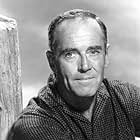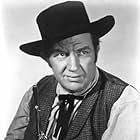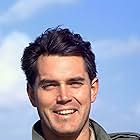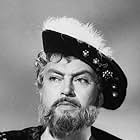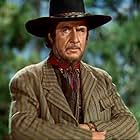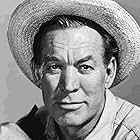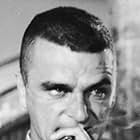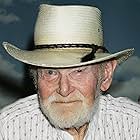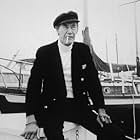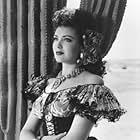The Western films of iconic director John Ford are fondly remembered by stars James Stewart, Henry Fonda, and John Wayne, with whom he shoots a scene in Monument Valley.The Western films of iconic director John Ford are fondly remembered by stars James Stewart, Henry Fonda, and John Wayne, with whom he shoots a scene in Monument Valley.The Western films of iconic director John Ford are fondly remembered by stars James Stewart, Henry Fonda, and John Wayne, with whom he shoots a scene in Monument Valley.
Jeffrey Hunter
- actor 'The Searchers'
- (archive footage)
Pedro Armendáriz
- actor 'Fort Apache'
- (archive footage)
- (uncredited)
George Bancroft
- actor 'Stagecoach'
- (archive footage)
- (uncredited)
Paul Birch
- actor 'The Man Who Shot Liberty Valance'
- (archive footage)
- (uncredited)
Ward Bond
- actor 'Fort Apache'
- (archive footage)
- (uncredited)
Henry Brandon
- actor 'The Searchers'
- (archive footage)
- (uncredited)
Walter Brennan
- actor 'My Darling Clementine'
- (archive footage)
- (uncredited)
Yakima Canutt
- actor 'Stagecoach'
- (archive footage)
- (uncredited)
Harry Carey Jr.
- Sandy
- (archive footage)
- (uncredited)
Olive Carey
- actress 'The Searchers'
- (archive footage)
- (uncredited)
John Carradine
- Actor 'Stagecoach' and 'Cheyenne Autumn'
- (archive footage)
- (uncredited)
Ken Curtis
- actor 'Rio Grande'
- (archive footage)
- (uncredited)
Linda Darnell
- actress 'My Darling Clementine'
- (archive footage)
- (uncredited)
- Director
- Writers
- All cast & crew
- Production, box office & more at IMDbPro
Storyline
Did you know
- ConnectionsFeatured in John Ford et Monument Valley (2013)
- SoundtracksThe Whifffenpoof Song
(uncredited)
Music by Guy H. Scull
Lyrics by Meade Minnigerode and George S. Pomeroy (first published 1909)
Sung by John Ford
Featured review
John Wayne, Henry Fonda, and Jimmy Stewart reminisce with John "Pappy" Ford about the old days of 1930 to 1964, when Westerns were being churned out wholesale, an art (if that's what it was) so American that it can be compared to jazz.
In 1973, all the participants were past their prime. Ford had made his last movie, the disastrous "Seven Women", in 1966. Everybody gets old, and when they do, their resources are depleted. Inspiration flags, long-time friends die or drift away, the deserts are turned not into gardens but into housing developments. The wonder of it is that directors last as long as they do.
That's depressing, but it's not the focus of these jovial conversations and tales. What emerges is vital and often funny, without carrying any particular degree of insight. ("The Western was founded on a dream", etc.) There are numerous clips from Ford's films and a great deal of action and comedy.
The comic scenes include one I've always admired for all of the constituents that are left unspoken. In the post Civil War Western, "Rio Grande", trooper Victor McLaglen, a bit drunk, is schmoozing with the company's doctor, Chill Wills, who is whittling on a sizable wooden stick. Throughout the film, Maureen O'Hara, a Southern lady has been harassing McLaglen for burning her plantation in the Shenandoah Valley, repeatedly shaming him by accusing him of being an "arsonist." Finally, McLaglen asks the doc exactly what an "arsonist" is. Chill Wills explains and McLaglen laughs with relief -- "Oh, is THAT all!" But the scene doesn't end there. McLaglen, now pretty drunk, begins to loathe himself for having burned the plantation. "And there's the hand that did the dirty deed!", he exclaims, staring at the offending appendage. He spits on it and says, "I wish you'd take that stick and whack it off!" Chills immediately raises the heavy stick and whacks the hand with all his might, breaking the stick in two. Silence. Wills returns placidly to his whittling. McLaglen, with tears of genuine pain, shakes his stricken hand and blows on it.
It loses in the telling because the performances and direction in the scene are as good as they are.
But, then, not everything is explored anyway. This is supposed to be a satisfying look back at the wraith of former pleasantries, not a penetrating discourse. Ford is described as a prankster but he was rather more than that. He reveled in humiliating his casts. He clearly enjoyed their anguish, both emotional and physical. James Cagney wrote that Ford was a "sadist". There is no reference to an incident in which Ford punched Fonda in the face. And the narrative has been cleaned up a bit for television. The "arsonist" joke I described was deleted. And when Wayne tells us "No stunt man was ever hurt on a Ford picture," he's not entirely accurate. An old friend of Ford's, a stunt man named Kennedy, broke his neck during a saddle fall in "The Horse Soldiers."
None of that detracts from Ford's professional curriculum vitae. He directed some of the best American Westerns ever made, and some of American cinema's most moving moments. But aside from the sentiment, the action, and the comedy, Ford's work at times was almost poetic, although he would never admit it. ("Just a job of work.") And this documentary is warm and generous with its subject. Just as well. The elegy befits a master craftsman.
In 1973, all the participants were past their prime. Ford had made his last movie, the disastrous "Seven Women", in 1966. Everybody gets old, and when they do, their resources are depleted. Inspiration flags, long-time friends die or drift away, the deserts are turned not into gardens but into housing developments. The wonder of it is that directors last as long as they do.
That's depressing, but it's not the focus of these jovial conversations and tales. What emerges is vital and often funny, without carrying any particular degree of insight. ("The Western was founded on a dream", etc.) There are numerous clips from Ford's films and a great deal of action and comedy.
The comic scenes include one I've always admired for all of the constituents that are left unspoken. In the post Civil War Western, "Rio Grande", trooper Victor McLaglen, a bit drunk, is schmoozing with the company's doctor, Chill Wills, who is whittling on a sizable wooden stick. Throughout the film, Maureen O'Hara, a Southern lady has been harassing McLaglen for burning her plantation in the Shenandoah Valley, repeatedly shaming him by accusing him of being an "arsonist." Finally, McLaglen asks the doc exactly what an "arsonist" is. Chill Wills explains and McLaglen laughs with relief -- "Oh, is THAT all!" But the scene doesn't end there. McLaglen, now pretty drunk, begins to loathe himself for having burned the plantation. "And there's the hand that did the dirty deed!", he exclaims, staring at the offending appendage. He spits on it and says, "I wish you'd take that stick and whack it off!" Chills immediately raises the heavy stick and whacks the hand with all his might, breaking the stick in two. Silence. Wills returns placidly to his whittling. McLaglen, with tears of genuine pain, shakes his stricken hand and blows on it.
It loses in the telling because the performances and direction in the scene are as good as they are.
But, then, not everything is explored anyway. This is supposed to be a satisfying look back at the wraith of former pleasantries, not a penetrating discourse. Ford is described as a prankster but he was rather more than that. He reveled in humiliating his casts. He clearly enjoyed their anguish, both emotional and physical. James Cagney wrote that Ford was a "sadist". There is no reference to an incident in which Ford punched Fonda in the face. And the narrative has been cleaned up a bit for television. The "arsonist" joke I described was deleted. And when Wayne tells us "No stunt man was ever hurt on a Ford picture," he's not entirely accurate. An old friend of Ford's, a stunt man named Kennedy, broke his neck during a saddle fall in "The Horse Soldiers."
None of that detracts from Ford's professional curriculum vitae. He directed some of the best American Westerns ever made, and some of American cinema's most moving moments. But aside from the sentiment, the action, and the comedy, Ford's work at times was almost poetic, although he would never admit it. ("Just a job of work.") And this documentary is warm and generous with its subject. Just as well. The elegy befits a master craftsman.
- rmax304823
- Feb 7, 2014
- Permalink
Details
- Release date
- Country of origin
- Language
- Also known as
- El viejo Oeste de John Ford
- Filming locations
- Stage B, 20th Century Fox Studios - 10201 Pico Blvd., Century City, Los Angeles, California, USA(Studio exterior with Fonda)
- Production companies
- See more company credits at IMDbPro
- Runtime52 minutes
- Color
- Sound mix
- Aspect ratio
- 1.33 : 1
Contribute to this page
Suggest an edit or add missing content








